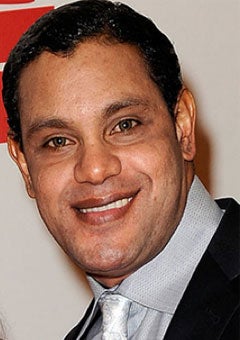
His current conk, green contacts and continued use of skin lightening cream is a far departure from the Sammy Sosa of old — a robustly brown-hued man with textured hair and dark eyes, i.e., he actually looked Black.
What does he look like now? Let’s put it this way… or better, let’s put it the way (in 140 words or less) cultural critic and Columbia University Professor Marc Lamont Hill did: “WHAT THE F—- IS WRONG WITH SAMMY SOSA?… Sadly, too many of us think white people’s ice is colder.” Another gent in my timeline said, “Sosa looks like Bob from Marketing on Martin.” *dead*
Continuous disbelief and witty punchlines aside, I find the outrage over Sosa’s appearance a little troubling. It seems to be commonly accepted practice that Black women alter their hair texture, or even add hair to rock styles unachievable by most Black-girl follicles. There’s a million reasons why Black women do this en masse like, I dunnno, living in a country where the beauty standard is White and blond (and straight), and that definition of beauty is so commonly accepted that (a once) credible magazine like Psychology Today could publish an article explaining why Black women aren’t attractive. That could be it. And hence, you’ll hear no judgment from me on perms and weaves. But what exactly makes those so okay that “good hair” is revered as a luxury item, and skin bleaching, not so much?
Back in January, I wrote about Sosa’s switcheroo hue on my personal blog in a two-part series, “The Napoleon Complex of Complexion” and “Skin Bleaching, Straight Hair, and Black Self-Hate.” In response to both posts, most comments blasted Sosa. But there was one regular contributor who just could not bring herself to do so. She wrote, “When I think about the BILLIONS of dollars that Black women spend to chemically process, heat straighten, weave and wig their hair, to imitate the hairstyles that are more compatible with straight [white] hair, it suddenly dawns on me how much HYPOCRISY is in the Black culture. For some reason, we see skin whitening as some form of BLASPHEMY against blackness, but find hair straightening to be a PERFECTLY ACCEPTABLE practice… even as a rite of passage for Black female children, into adulthood.”
Hmm…
We can’t be naïve enough to think that women are the only ones affected by being bombarded with messages like “white is better, ideal, or ice-cold.” Clearly, Sammy has been hit too, hence the new skin, hair and eyes. However, for all the essays written on why Black women do _________ to alter their appearance and how it boils down to being under some sort of psychological warfare, we rarely talk about the way Black men internalize that “White is right image.” That is, unless we’re talking about why twenty percent of them marry non-Black women. But how about how they internalize those messages about what makes themselves attractive — or not? I’ve only heard that discussion once — when Rachel from School Daze told Dap Dunlap, “I think you have a problem with light-skinned Blacks.” (Which, of course, he denied.)
I’d like to hear a conversation for men and by men that addresses their self-esteem before we get more extreme alterations like Sosa’s. And no, that concept isn’t that far-fetched. Our favorite American beauty brands like Nivea, Vaseline, Garnier and L’Oreal all create skin-bleaching creams for men (they’re currently sold overseas). And a little closer to home, we’ve got Jamaican reggae artist Vybz Kartel, who also came under fire earlier this year for lightening his skin from dark and lovely, to pale and ghastly. His rebuttal to the criticism? Poignant and ultimately, classic:
“When Black women stop straightening their hair and wearing wigs and weaves… then I’ll stop using the ‘cakesoap’ and we’ll all live naturally ever after. Until then, f—- you all.”
Discuss.
Demetria L. Lucas is the Relationships Editor at Essence Magazine and the author of A Belle in Brooklyn: Your Go-to Girl for Advice on Living Your Best Single Life & Enjoying Mr. Right Now (Atria.) Follow her on Twitter at @abelleinbk